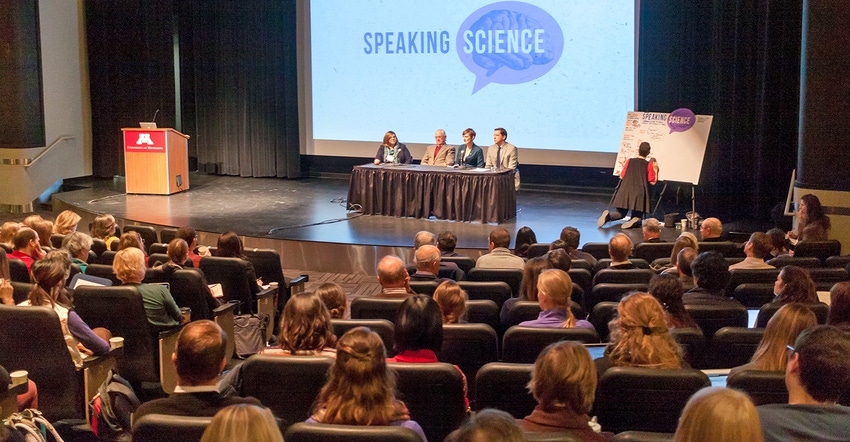January 22, 2018

Farmers and scientists share similar challenges in communicating with consumers and the media.
Both groups find they need to step away from speaking in the vernacular, using acronyms and getting too detailed when explaining something. Both often face audiences with personal biases that challenge understanding in a variety of areas, including biotechnology and good foods versus bad foods.
And when they do engage in discussions, farmers and scientists sometimes get frustrated when their messages are taken out of context or made to sound more important or impactful than they really are.
Bottom line: Scientists wish consumers were more science-literate, just as farmers wish consumers were more ag-literate.
These similar challenges became evident as I served as a media partner at the first annual “Speaking Science” conference Jan. 11 at the University of Minnesota. The conference, initiated by the College of Biological Sciences, College of Science and Engineering and the Institute on the Environment, was designed to help U-M science and engineering faculty, and postdoc and graduate students, improve their communication skills so they can make their work understandable and compelling to the media, general audiences, thought leaders and potential funders.
I was asked to participate with more than a dozen other media professionals in an afternoon of multiple mock interviews. More than 400 participants attended the conference. The “Interacting with the Media” track was one of the optional afternoon breakout sessions.
Giving feedback
Those were high-energy, noisy sessions, which began after we had introductions and settled into our small groups. Roughly every 15 minutes, I was paired with two scientists who took turns presenting their research topics. My job was to listen, ask questions and give feedback on how they shared their information.
I had the opportunity to hear brief pitches on a variety of subjects, including nitrogen fertilizer losses in various landscapes, the possible extinction of the rusty-patched bumblebee, the impact of surface temperature on ecosystems, invasive species threats, consumer food education, oat crown rust, mushrooms and gut health, and floodplain biodiversity. All were very interesting to me, an elementary science geek.
I empathized with their frustration to tell their stories to those who have no interest or understanding of their research. We concurred that we all have to just keep talking, usually one on one, to build relationships and trust.
Sounds familiar?
Although I was on data overload after the session ended, I left feeling enthusiastic and grateful for the talented folks who shared their research with me. They indeed have stories to share, and I wish them well as they do so.
Overall, the whole day was a hit for its participants. Indirectly, I heard very positive feedback specific to the media session. One participant shared:
“‘Speaking Science’ was great! It helped remind us that we can communicate our work in our other languages besides science. We can speak as neighbors, friends and family. Having so many journalists and communication specialists willing to come to ‘Speaking Science’ and work with us makes me hopeful that programs like ‘Speaking Science’ will become embedded in higher education.”
And another observed:
“The sessions on ‘Building Better Presentations’ and ‘Interacting with the Media’ were excellent. We got so many new ideas and actual strategies out of the event. Honestly, I felt like my professional communication skills actually improved from the beginning of the day to the end! It was one of the best trainings or events I have been to in my career.”
Based on the feedback, organizers say “Speaking Science” will be back next year at U-M.
I look forward to participating again.
You May Also Like




